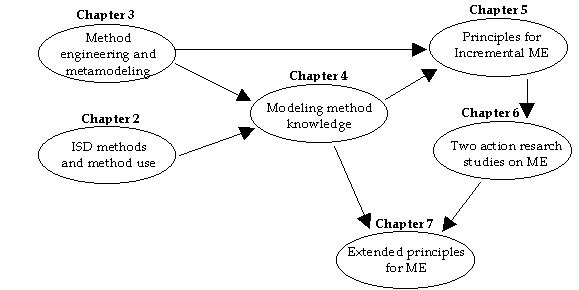1.6 Outline of the thesis
The thesis is divided into seven chapters (cf. Figure 1-3).
After this introduction and problem formulation, Chapter 2 surveys major lines
of research on ISD methods, defines ISD, and characterizes the role of a method
and tools in its enactment. We shall also clarify mutual relationships between
ISD methods and computer-aided environments such as CASE tools. In Chapter 3 we
survey the literature on metamodeling and method engineering. Our goal here is
first to introduce some principle elements of ME, and second to examine what
kind of ME tasks and metamodeling languages have been proposed to address method
development. The limitations of current ME approaches, especially related to
representing method knowledge and improving methods in use, form a motivation
for the development of an incremental ME approach.
FIGURE 1-3 Structure of the thesis.
In Chapter 4 we study the issue of representing method
knowledge, modeling and implementing a large portion of ISD methods into a
modeling tool. Thus, our focus here is on studying the first research question,
“how completely can meta-data models represent knowledge about ISD methods
for modeling tools?”. We study what constructs are needed for metamodeling
languages by using content analysis to obtain method knowledge from 17 ISD
methods. This leads us to propose some extensions to ME and especially to the
languages it applies.
Chapters 5 and 6 concentrate on the second research
question: “how can experience of method use together with metamodels be
applied for method refinements?”. Chapter 5 puts forward principles of
incremental ME, and studies method development through experience-based method
refinement. We propose some ideas for understanding method evolution and the
dynamic nature of ME: how the applicability of methods can be evaluated and
maintained in changing ISD environments. These principles are applied in two
cases (Chapter 6) in which we study local method development in practice. We
apply the proposed ME principles together with existing tools to investigate the
incremental ME approach. In these studies our primary interest is not on how
efficiently an organization develops ISs, but on how they learn about methods
during their use, and how this knowledge can be incorporated back into methods.
Finally, in Chapter 7 we shall recapitulate major findings of the thesis, and
propose issues inviting future research.





